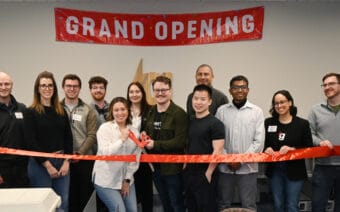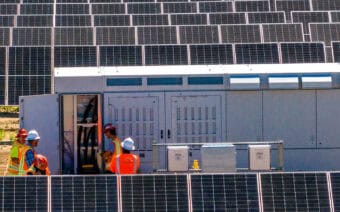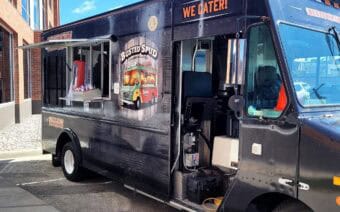
November 4, 2024
APPLETON – A self-proclaimed nerd, Weston Timmers said helping others solve problems in his role as a controllers product manager at Werner Electric Supply is a “really enjoyable” job.
“Customers will oftentimes bring us in when they’re either having an issue with their existing equipment or when they want to make something safer or more efficient,” he said. “When we can come in and provide a solution that either meets or exceeds their expectations – that’s always a really enjoyable feeling.”
Timmers – who earned a computer engineering degree from the University of Wisconsin-Milwaukee and an industrial networking specialist certification from Cisco – has been with Werner Electric since 2012 when he started in a technical support role right after college.
As he worked his way through the ranks, gaining knowledge, expertise and a variety of different titles along the way, Timmers was getting noticed – not just by the customers he interacted with but by the company’s leadership as well.
So much so, that company leadership nominated the Black Creek native for the National Association of Electrical Distributors (NAED) tED Magazine Top 30 under 35 award.
Timmers was selected as a top 30 from more than 150 nominations nationwide.
Shocked by the selection – “I didn’t even know I was nominated” – Timmers said he’s humbled that not only his company leadership saw fit to recognize his work, but so, too, did the NAED.
“I was nominated by one of our executives based on the work that I do,” he said. “I don’t have a big ego. I just enjoy what I do, and I try to do it well, but it’s always really cool to be recognized for that. It is pretty humbling to see that others within my organization recognize that and were kind enough to nominate me for such an award – felt really special.”
Sparks fly
Though his work isn’t impacted by whether or not he receives recognition, Timmers said highlighting the work young professionals are doing in their respective fields is important for various reasons.
“Recognition is super important so people realize that the good work they’re doing isn’t going unnoticed,” he said. “Oftentimes, you don’t hear about it, right? You hear about when you do something wrong or something doesn’t go right. So it’s always just so nice to hear something positive if you do something well.”
Timmers said that can be as simple as a high-five or a nomination for a national award – “all recognition is important.”
“Being a people manager myself, I think it’s super important to recognize a job well done – keeping in mind that how people like to receive recognition differs,” he said.
Recognizing young professionals in the electrical industry, he said, is potentially even more important, “because historically, the workforce that has been in this industry hasn’t included many young people.”
“I think it’s really cool that NAED recognizes young people who are coming in and doing really good work within this industry – because there’s not a lot of us,” he said.
Timmers said he sees the focus NAED’s Top 30 Under 35 recognition puts on the electrical industry as a whole, as equally important.
“It shines a spotlight on the industry,” he said. “It draws some attention to it to say, ‘Hey, there’s something cool going on here. There are some really smart, talented people in this industry. It’s a cool industry, and it’s growing.’”
This comes into play, Timmers said, with talent attraction and retention – which as with many other industries is hard to come by.
“Finding good talent these days is very difficult,” he said. “Being that the workforce that we have is kind of aging out, we need to bring in new people. So, I think it’s important that people recognize that there is a lot to be offered in the industry – which in turn will hopefully spur interest and get people excited about coming into this industry.”
Ever-evolving industry
Over his decade-plus at Werner Electric, Timmers said he’s witnessed a lot of change – not just with technology and products but also within the industry itself.
“Technology is evolving very rapidly,” he said.
Though many are aware of the evolution of consumer technology, Timmers said the technological applications in an industrial and/or manufacturing setting are much less known.
“A lot of people don’t realize that there is this whole other use for technology in manufacturing,” he said. “To me, that is one of the most exciting aspects that’s changed in the 12 years that I’ve been working here.”
Though Werner Electric was involved in a variety of high-tech projects then, Timmers said some of the more recent changes – including the introduction of artificial intelligence (AI) and the products and software that has accompanied it – are on another level.
“(AI) takes the automation that we were doing in the past and elevates it to a whole other level that I never saw coming,” he said. “I didn’t think that was possible back when I first started.”
Beyond technology, Timmers said Werner Electric’s customer base has also evolved and expanded in the last 10-plus years.
“Manufacturing as a whole, I think, is evolving,” he said. “The need for safety is higher than it’s ever been because as you automate things, machines are doing more and more on their own. You have robotics and things moving around – the safety aspect of it, keeping the physical employees safe in an environment like that, is super important.”
Nowadays, Timmers said companies are also poised to do more with the data they are producing.
“In the past, you’d have some equipment making X widgets per day, per hour – whatever that might be – and you’re keeping track of that,” he said. “Maybe it’s automated, maybe it’s manual. But now we’re getting to the point where we can use a lot of the data that’s being generated to not only keep track of the production metrics but also be able to make real-time decisions based off of the data.”
Timmers said there are “so many efficiencies to be had” if you can collect and use the data in an “intelligent fashion.”
“(Companies are) able to identify, ‘hey, we’re going to run out of this raw material for our product at this time, so we need to make sure we can schedule to have replenishment where it needs to be and when it needs to be there,’” he said.
The name – Werner Electric Supply – Timmers said can be a little misleading.
“We’re shifting a lot into providing services that we hadn’t in the past,” he said. “So not only supplying the product and the expertise to help support that product, in a lot of cases, we can now offer service to directly do the work by implementing some of these things on behalf of the customers.”
Though Werner did pockets of that previously throughout the company, Timmers said the emphasis on service has increased over the last couple of years.
“Going forward, (we plan to continue) being a full-solution provider where we can provide the technology, the expertise and then also help with the implementation,” he said.
Timmers said that means keeping up to date on the industry’s “latest and greatest,” which includes robotics, networking and cybersecurity.
“We need to be the experts to help our customers make sure they’re able to implement these technologies appropriately, safely and securely,” he said.
Timmers said continuing to expand and excel in these areas helps change the narrative of Werner for those who think “they’re an electrical part distributor – they just sell parts.”
“Yes, we do that,” he said. “We support our contractor customers that are doing electrical installations – so, we sell wire and conduit and cable and tools and everything that goes into the electrical contractor industry – but we also have this whole other half of our business, which is the high-tech automation stuff.”
Timmers said this secondary focus allows Werner to help support companies that are at different levels of their Industry 4.0 journeys.
With many small-to-medium–sized businesses not having the expertise on staff to make that digital transformation, Timmers said that’s where he and his team at Werner come in.
Part of this is showcased, he said, with Werner’s recently opened innovation center.
“That was something that we designed and built fully in-house with our experts on staff,” he said. “It’s basically a production line right within our facility so that we can bring customers in and show them how these new products can be implemented, and the things they can do with them.”
In a manufacturing environment, Timmers said time is critical and companies can’t just shut the machine down for a day to do training on how to troubleshoot or fix things.
“A lot of times, it just happens on the fly,” he said. “When something breaks, they are kind of left to figure it out (in the moment).”
With the production line set up at Werner, Timmers said, it’s not running real production, “so we can put bugs into the system and bring people in and train them on how to fix something in an environment that’s safe.”
“And there is no worry about loss of production,” he said.
 Powering forward with solar energy
Powering forward with solar energy Economic snapshot: Amid U.S. uncertainty, optimism in NE Wisconsin
Economic snapshot: Amid U.S. uncertainty, optimism in NE Wisconsin








